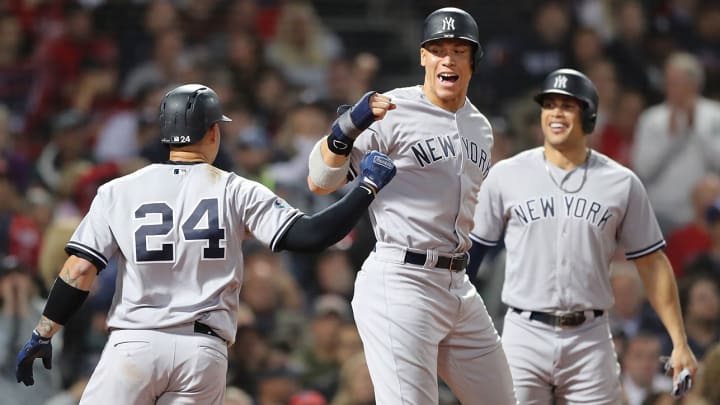Yankees Slugger Aaron Judge Quickly Becoming Postseason's Toughest Out

BOSTON — It’s the question that every American League pitcher would love to know the answer to, and one that Red Sox manager Alex Cora and his staff have tried but mostly failed to figure out through the first two games of the Division Series. How do you get Aaron Judge—behemoth Yankees slugger, the best player in a relentless lineup, and currently the hottest hitter on earth—out?
Luckily for Boston, New York hitting coach Marcus Thames has some advice that he was happy to share when asked after Saturday night’s Game 2, in which Judge launched a solo homer off David Price—already his third this postseason—and reached base four times to key a 6–2 Yankees win. So, Marcus: What’s the secret to beating Judge?
“Throw it right down the middle,” he said, as a big grin spread across his face.
Spoiler alert: If you’re a pitcher who’s facing Judge, you should absolutely not do that. (Or you could try anyway, but know that Judge slugged .786 on pitches in the heart of the strike zone this season. So yeah, maybe find a different approach.) Then again, Thames’ would-be subterfuge might be as good a strategy as any, given that nothing else at the moment is producing desired results.
Even After Latest Postseason Implosion, Don't Write Off David Price Just Yet
The sample size is as tiny as Judge is tall, but it nonetheless paints a grim picture for opposing pitchers past, present and future. In three playoff games—the wild-card victory over Oakland and the first two of the series against Boston—Judge has picked up seven hits and two walks (and, perhaps most incredible for him, only two strikeouts) in 14 plate appearances for a ludicrous .583/.643/1.417 line. And his contact hasn’t been cheap, either. The first-inning blast that helped sink the Athletics in the wild-card game left his bat at 116.1 mph, the hardest-hit home run ever tracked by Statcast in the postseason. On Saturday, meanwhile, three of the four balls he put in play went 109 mph or faster. It’s the kind of tear that has opposing pitchers redefining what a successful duel with him looks like.
“Honestly, you give up a solo home run to him, and I don’t want to say it’s a victory, but it’s not the worst thing in the world,” said Red Sox righthander Rick Porcello, who will stand in Judge’s sights as Tuesday’s Game 4 starter.
All the more impressive is that Judge is doing this off an injury that could have seriously complicated both his swing and the Yankees’ World Series hopes. After getting plunked on the hand by the Royals’ Jake Junis on July 26 and suffering a chip fracture in his right wrist, Judge ended up missing nearly two months of action despite an initial projection of just three-to-four weeks on the sideline. It’s a timetable that Yankees general manager Brian Cashman later admitted was “off considerably,” and resulted in a regular, frustrating routine for Judge with reporters: daily questions on the state of his wrist, non-committal answers as to when he’d return, rinse and repeat.
But as time passed and the Yankees fell out of the AL East race without Judge, he did everything in his power to get back before October. “I knew once I got told it was broken, it was probably going to be about an eight-to-nine week process of getting back,” he told reporters after Game 2. “I checked the calendar and went to work.”
It was easy to imagine, given how many hitters have had seasons derailed by broken bones and torn tendons in that most crucial of joints, that Judge would return diminished at the plate. But Thames said that he quickly showed, once he was cleared to resume hitting, that all was well.
“Once he came back and played that first game against Boston [on Sept. 18], when he said I’m 100% healthy, I said let’s go,” Thames said. “The first ball he hit that night, he hit it 112 miles per hour off the bat, and I was like, alright, he’s ready.”
Judge hit just .220 with one home run in 51 plate appearances to finish the year, but Thames wasn’t worried about the down numbers. “I knew he was going to have some timing issues here and there, but at the same time, I knew he worked hard before he came back to make sure he was ready to go,” he said. “If he’s controlling the strike zone, he’s going to be just fine.”

He’s been more than fine since the calendar flipped to October. That’s good news for the Yankees, who struggled without him, going 26–21 while he was out of the lineup. But to paraphrase former New York manager Joe Girardi, it’s not what other teams wanted. To the long list of issues confronting Cora as the Division Series shifts to the Bronx, a top priority has to be trying to slow down Judge. That’s easier said than done.
“He’s a monster,” said Red Sox reliever Matt Barnes, who has yet to face him this postseason. “He’s a guy who can hit for average and power and drive the ball to rightfield. It’s tough to beat him on the outer third of the plate.” (Case in point: Judge’s homer off Price, a two-strike cut fastball that was thigh-high but still away enough to force Judge to extend his arms; he yanked it 445 feet at 113 mph into the Green Monster seats in leftfield.)
What makes it worse, though, is that even if Boston can find a way to neutralize Judge, it still has to contend with the rest of a batting order that led the majors in home runs. The Yankees are no one-man show: Even on a night when Judge went deep and picked up two hits, his effort was overshadowed by Gary Sanchez’s two-homer game.
“What makes him good is the guys around him, too,” Porcello said. “He makes those guys better, they make him better. It’s not like you pitch around Aaron Judge and the rest of the guys you’re going to have a cake walk.”
Last October, after a Herculean season that nearly earned him AL MVP honors, Judge was far more human in his first ever trip to the playoffs. Though he went deep four times, he hit .188 and struck out 27 times in 57 plate appearances. But a year later, he looks like, well, Aaron Judge, spraying line drives and smashing home runs and presenting pitchers with baseball’s equivalent of a Millennium Prize Problem: potentially solvable, perhaps impossible.
When asked how you handle Judge, Porcello sighed before falling back on the old chestnut of executing the game plan. “You go out there, make your pitches, play the cat and mouse game, and see where you end up,” he said. But, he added, “I can’t really answer what to do to Aaron Judge.” He literally can’t: No player on any team is going to come out and tell a reporter in the middle of a playoff series exactly what advantage they’re trying to exploit to take out a superstar. But it also works as an unintentional admission that right now, there is no solution, easy or otherwise. All you can do is throw it—preferably not right down the middle—and hope for the best.
